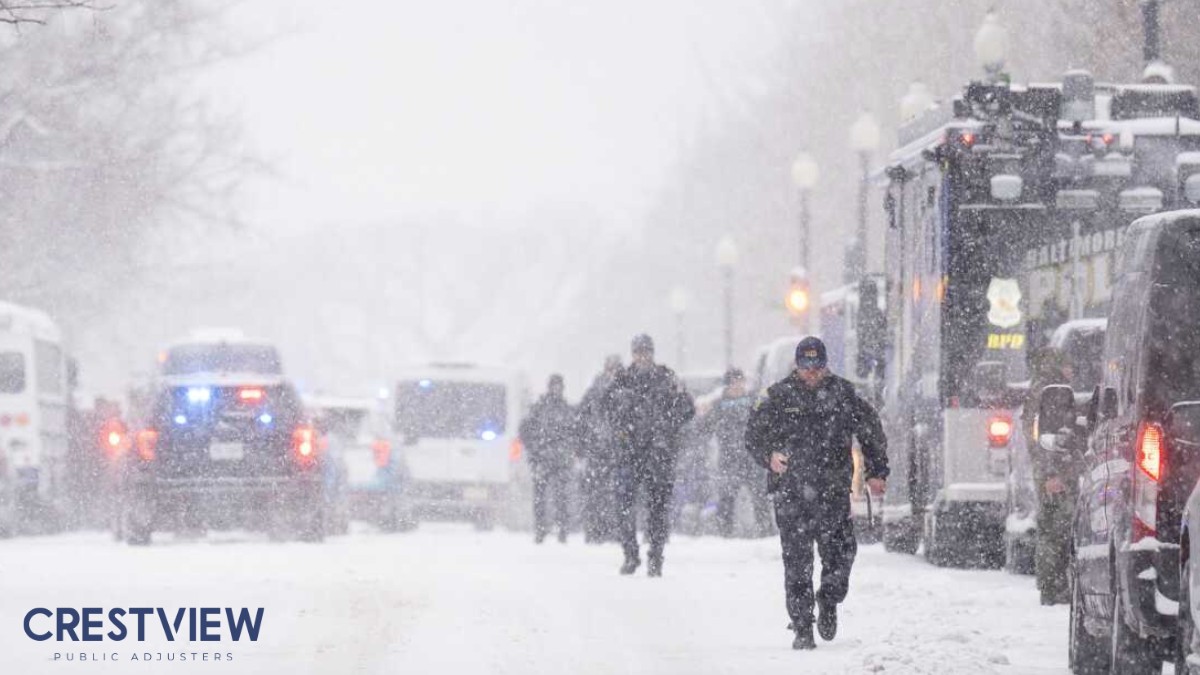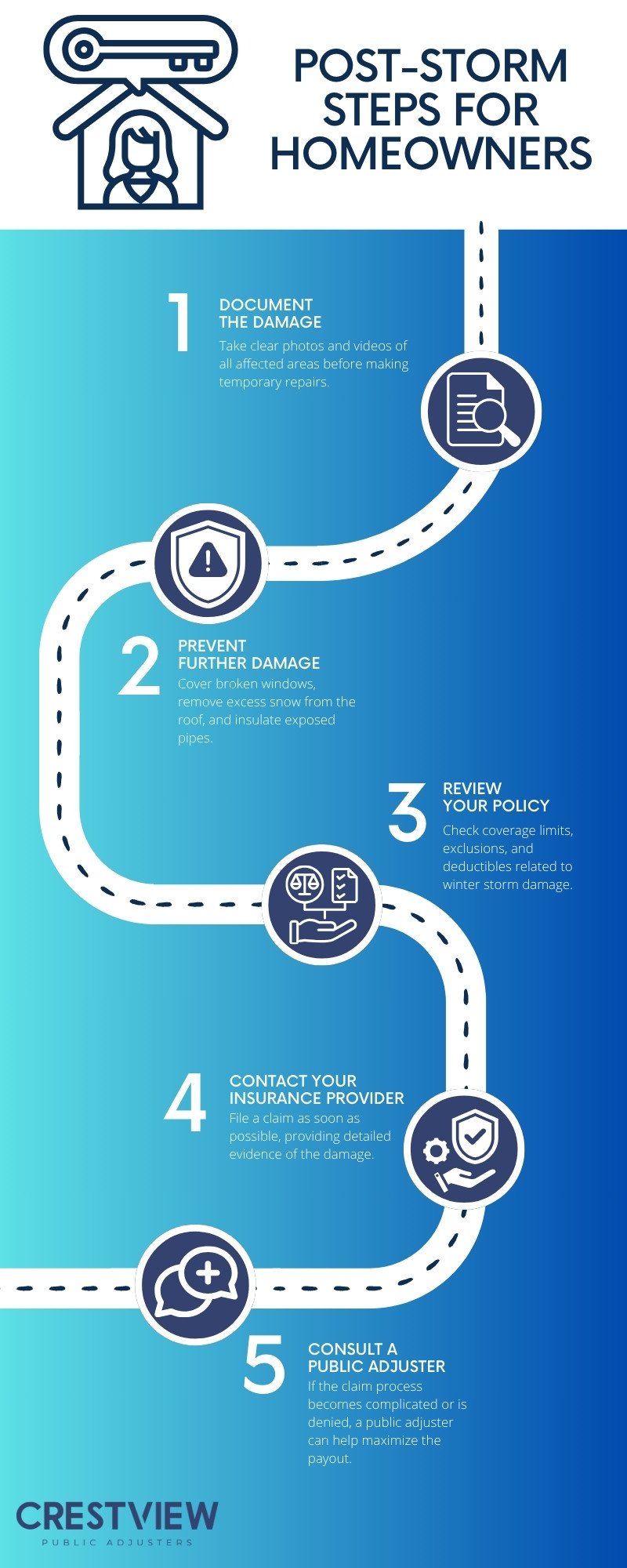Key Points:
- Climate change is intensifying winter storms by increasing moisture levels and disrupting atmospheric patterns.
- Policyholders are experiencing rising insurance costs and more claim denials due to extreme storm damage.
- Public adjusters can help homeowners navigate complex winter storm claims and maximize payouts.
Winter storms are becoming more severe due to climate change, leading to higher insurance claims and increased claim denials. Rising global temperatures allow the atmosphere to hold more moisture, fueling heavier snowfall and more intense blizzards. At the same time, warming disrupts the polar vortex, increasing the likelihood of extreme cold spells. This combination results in greater damage to homes and businesses, driving up insurance costs and making claims more difficult to process.
Why Are Winter Storms Getting Worse?
Winter storms have become more intense over the past few decades, and experts attribute this shift to climate change. While cold weather may seem counterintuitive in a warming world, the science behind it is clear.
One major factor is the polar vortex disruption. The polar vortex is a mass of cold air that typically stays near the Arctic. However, rising global temperatures weaken the jet stream, allowing frigid Arctic air to push farther south. This results in prolonged cold waves and intense winter storms in regions that don’t usually experience such extreme weather.
Effects of Climate Change on Winter Storms
Climate change is altering winter storm patterns in several ways:
- Stronger blizzards: Increased moisture fuels heavier snowfall, leading to record-breaking storms.
- Longer freezing periods: Arctic air outbreaks become more persistent, causing prolonged freezes.
- Higher wind speeds: Shifts in atmospheric circulation intensify storm winds, increasing property damage.
These factors make winter storms more destructive, significantly impacting insurance claims and coverage policies.
How Climate Change is Impacting Insurance Claims
As winter storms intensify, homeowners and businesses face more severe damage—yet insurance companies are becoming increasingly strict about payouts. The cost of winter storm claims has surged, leading insurers to adjust policies, raise premiums, and deny more claims.

Rising Insurance Premiums
Insurance companies calculate risk based on historical weather patterns. With climate change increasing storm severity, insurers must adjust their models to account for greater damages. This results in:
- Higher deductibles for winter-related claims
- Reduced coverage for ice and snow damage
- More exclusions for extreme weather events
In regions hit hardest by winter storms, some insurers have even stopped offering coverage altogether, leaving homeowners with fewer options.
Common Winter Storm Insurance Claim Denials
Many policyholders assume their homeowners’ insurance covers all winter-related damages, but insurers often deny claims based on specific policy exclusions. Common reasons for winter storm claim denials include:
- Gradual damage: Insurers may argue that damage from ice buildup or roof collapse resulted from long-term neglect rather than a single storm.
- Flooding exclusions: Standard homeowners’ insurance doesn’t cover flood damage, including snowmelt flooding.
- Lack of maintenance: If insurers determine that a burst pipe or collapsed roof was preventable with routine maintenance, they may deny the claim.
These denials leave many homeowners struggling to recover from storm damage, underscoring the need for expert assistance in navigating insurance claims.
Steps Homeowners Should Take After a Winter Storm
After a severe winter storm, acting quickly can help policyholders secure a successful insurance claim. Homeowners should follow these steps:

Taking these steps, homeowners can strengthen their claims and improve their chances of receiving fair compensation.
How Public Adjusters Help with Winter Storm Claims
Given the rising complexity of insurance claims related to severe winter weather, public adjusters play a crucial role in ensuring policyholders receive the compensation they deserve. Unlike insurance company adjusters, who work to minimize payouts, public adjusters represent the homeowner’s best interests.
Benefits of Hiring a Public Adjuster
- Expert claim evaluation: Public adjusters thoroughly assess all damages and ensure nothing is overlooked.
- Policy interpretation: They help homeowners understand what is covered and how to navigate claim exclusions.
- Negotiation with insurers: Public adjusters handle communication with insurance companies, advocating for a fair settlement.
This expertise is particularly valuable in areas prone to extreme winter storms, where insurance companies may try to downplay or deny valid claims.
Get Expert Help for Winter Storm Damage Claims
Winter storms can cause serious property damage, making insurance claims overwhelming. That’s where Crestview comes in. As public adjusters specializing in winter storm claims in New Jersey, New York, and Florida, we help homeowners navigate the claims process and fight for fair compensation.
If your insurance provider is delaying, undervaluing, or denying your winter storm claim, don’t settle for less. Contact Crestview today to get the compensation you deserve.

